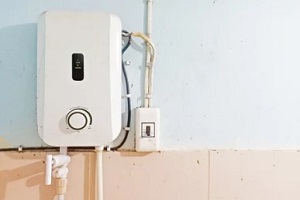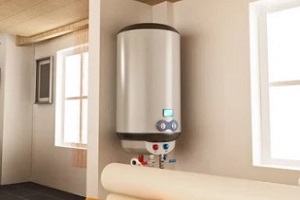
Tankless water heaters are growing in popularity in new homes as well as replacements for aging water heaters because they take up less space than traditional storage water heaters. However, they are not the right choice for every home.
Here is a look at what a tankless water heater is and some of the advantages and drawbacks of these models.
What Is A Tankless Water Heater?
A tankless water heater heats water directly. This means that when you turn on hot water in your home, cold water will travel through a pipe and into the unit, where it will then be heated by either an electric element or a gas burner. With a tankless heater, your home will have a constant supply of hot water available on demand.
The Benefits of Tankless Heaters
Here is a look at some of the pros of installing a tankless water heater.
Instant Hot Water
One of the most obvious benefits of using a tankless water heater is the fact that you will always have access to hot water. Traditional water heaters only provide a set amount of hot water – according to the capacity of the tank – before users must wait for more water to be heated.
Tankless water heaters provide an endless stream of hot water nearly instantly, which makes them incredibly convenient and reliable.
Lower Monthly Costs
Although a tankless water heater may be more expensive to purchase, the fact that it is more efficient may end up saving homeowners money in the long run.
According to Consumer Reports, tankless water heaters are 22 percent more efficient than a standard model. The monthly savings may not be significant, but it can add up to hundreds of dollars in savings each year.
It Takes Up Less Space
A tankless water heater is significantly smaller than a traditional water heater. They can usually be mounted on a wall in an inconspicuous place, with many homeowners opting to place it in the basement. This benefit is particularly useful in a smaller home.
Longer Lifespan
One big advantage of a tankless heater unit is its longer lifespan. Tankless models can function for two decades, whereas standard water heaters may only last up to a decade.
Hot Water Is Always Available
Traditional storage tanks eventually run out of hot water in homes with heavy hot water usage. For example, if several people in a family need to take showers in a row, the last person may find themselves bathing in cold water.
However, a tankless heater ensures that each person will have an equally warm shower when they are taken consecutively because it does not depend on water that it has reserved in order to meet the demand.
The Drawbacks of Tankless Heaters
Here is a look at some of the reasons that a tankless water heater may not be the answer.
Inconsistent Temperatures
One of the biggest complaints people have about these models is inconsistent water temperatures. This is due to the heater’s inability to send sufficient hot water to multiple outlets at the same time.
Although people taking showers consecutively might never run out of hot water, multiple people taking showers at the same time in the home may find that their water is not as hot as they would like. In addition, some homeowners note that their tankless heaters do not turn on when their faucet is slightly open, such as when brushing teeth.
Additional Equipment May Be Needed
In many cases, a water softener is needed to make sure that a tankless heater can operate properly. This not only makes getting a tankless heater more expensive, but it may also negate any space-saving benefits that come from getting a tankless unit because softener units tend to be bulky. A softener may even take up more space than a traditional water heater.

There Is A Greater Initial Cost
Tankless heaters may have a longer lifespan, but their price tag is also higher, which means that homeowners on a tight budget may not be able to make the initial investment needed.
The cheapest tankless options cost upwards of $1000, whereas the average traditional model has a price tag that is closer to $500. In addition, tankless units are more expensive to install, so it is important to take labor fees into account when calculating the overall expense of these units.
Gas Lines May Need To Be Rerouted
Because tankless water heaters use a nontraditional setup, it may be necessary for a contractor to reroute a gas line or add some new venting, which, in turn, increases the overall cost of the installation.
Get In Touch With Baumbach Plumbing & Remodeling
The experienced professionals at Baumbach Plumbing & Remodeling can advise you on all matters related to water heaters. Get in touch today to discuss your home’s hot water needs and find out how we can help.






